2016 Year in Review, Part 3: A drama for every day of the year
by girlfriday
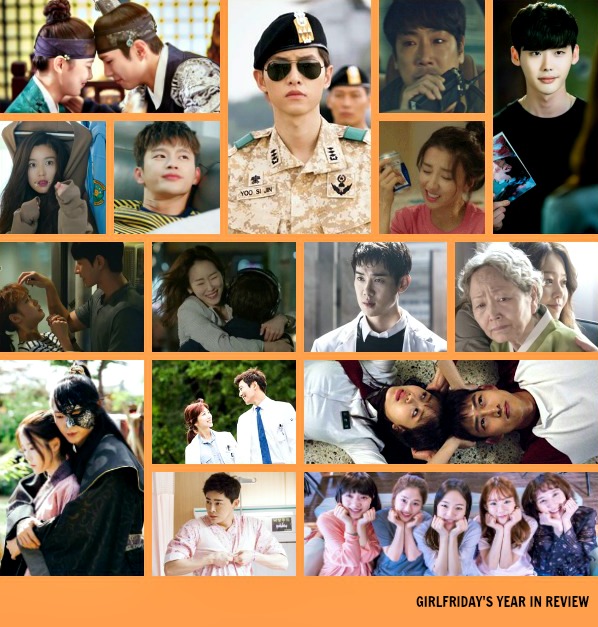
Is there such a thing as too much drama watching? Because I swear that last year around this time, I vowed to myself, with javabeans as witness, that I would watch fewer dramas in 2016. Well it turns out that Past Me was a liar. Maybe I was more patient this year (unlikely), or stubborn (possible), or bored (highly probable), because I finished more shows in one year than I ever have before. *holds out hands for shiny trophy*
Because I spent allllll of my days watching dramas this year, I thought I’d recommend a good day out of the year for you to pick up and watch each show. Whether you also finish it on that day is entirely up to you and your level of expertise as a marathon watcher. (Tip: Hydrate often, and take bathroom breaks during boardroom scenes and flashbacks.) Basically, if left to my own devices, I will find a drama for every day of the year, for every occasion and mood. I think I’m hitting upon the reason I watched so many shows…
Perhaps it’s a good sign that 2016 was full of such variety in dramaland that so many of us have walked away with a different batch of favorites at the end of the year. I always think it’s more interesting when that happens, and I can only hope that it’s an indication of a broadening drama landscape, with more to offer in years to come.
It’s been an eventful year here at Dramabeans, and we’re so happy that our little family of staff writers has grown (into a veritable minion army!), and we’re grateful to our larger family of readers for welcoming them with open arms.
Okay, enough mushy stuff! On to the reviews!
SONG OF THE DAY
Suran – “Step Step” (Jealousy Incarnate OST)
Audio clip: Adobe Flash Player (version 9 or above) is required to play this audio clip. Download the latest version here. You also need to have JavaScript enabled in your browser.
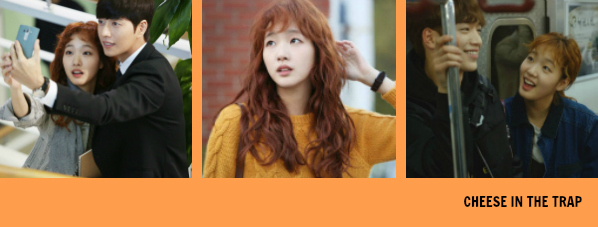
Watch this: The day before you go on a trip, so that you come home and forget to finish it.
Cheese in the Trap ended up being more famous for its backstage drama than for the drama itself, but I do remember loving it for being a moody, contemplative show with a great soundtrack and an offbeat romance. I was especially taken with the fresh themes and the unusual heroine, who was an endearing bundle of neurotic energy and haplessness, and a perfect embodiment of youthful insecurity (the kind of embarrassment you wish you didn’t write down in diaries, though of course you did). It was often frustrating to watch her get trampled on like a doormat and suffer quietly, but that also made it extra satisfying when she grew a spine and learned to stand up for herself. I wish I could say the same for… well, just about anything else in the story.
It’s just such a crying shame that a drama that started out with such a strong beginning ended up pooping on everything we’d come to love about it, leaving us to wonder if the enigmatic hero ever reformed his morally ambiguous ways, why the heroine became so jaded in the end, why the romance fizzled and then fixed itself magically offscreen (possibly, who even knows). I believed that they loved each other enough to overcome their differences… I think.
But, uh, I wanted to see it happen with my own two eyes. Isn’t that obvious? What is the point of telling a story where the good stuff happens outside of the story you are telling? I’m especially dissatisfied with this show’s ending because as a slice-of-life story, there were so many simple ways to end it that would’ve been acceptable, but I guess the production imploded on itself to the point that shooting a satisfying ending was impossible. I think it says something about the show that I still remember a good chunk of it very fondly; I just wish the cheese hadn’t turned sour by the end.
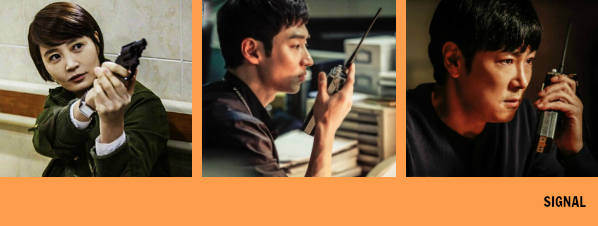
Watch this: On Groundhog Day.
Watching Signal was like hooking me up to a crack IV drip. I started it about halfway into its run and immediately turned into a bleary-eyed monster, demanding the next episode, and the next, and the next. Admittedly, it’s a formulaic framework within the episodes that gets repeated, so once you come out of the crack-induced haze, you realize that the plot isn’t as crazy complex as it seemed at the time—the information was just doled out in a brilliant fashion. But it was paced so well that I’d swear to myself that I would stop watching after this one, and then cliffhanger of doom and evil portent would return without fail, and I’d be sucked back in. It’s an art, I tell you.
I was lured by the cast and the cool concept of two detectives who could never meet, who would irrevocably alter each other’s lives by cheating the rules of time (thanks, magical walkie-talkie). But I think it was the writer’s ruthlessness that really hooked me, when I first saw that there could be dire consequences and innocent deaths in the present for changing something in the past. It was then that my stomach dropped, and I thought, Oh, they’re not messing around. I liked knowing that cheating time and space wasn’t a magical cure-all, even if it was magic of some sort, and suddenly you had to weigh everything in the balance. What if changing one more thing obliterated them all? Why was time circular in the past and linear in the present? If they fixed A, and then B, but Jo Jin-woong returned to the time before A, why does A still stand? That mental loop kept me up for hours on end.
It was a riveting drama that barreled towards the finish line without ever slowing down, and I remember thinking that the relentlessness of the pace and quality was particularly impressive. I expected no less from this director, and yet I was still surprised. As for the end, I do think it’s problematic to raise such big questions on a mythology level and not give satisfactory answers, and I dislike that it ended on the ultimate cliffhanger—its specialty—when it should’ve given us more finality and trusted that we’d come back anyway. I have a feeling my questions will never be answered, leaving them stuck in an endless loop for all of time. Won’t somebody answer their call?

Watch this: On your birthday. The possibility of meeting a younger man like Song Joong-ki might take the sting off of aging.
As one of the biggest dramas of 2016, I expected Descended From the Sun to stand out a little more from the pack, but I think it was one of those shows that I enjoyed while watching but never thought twice about. I did like it, and I even remember thinking that it was nice to watch a Kim Eun-sook drama that didn’t make me ragey. And Song Joong-ki the heroic soldier man might as well have been a superhero, he was that cool (seriously, I wondered the whole time if the army had sponsored the drama, because they should have).
I just wish the romance had felt as epic as it looked, but I never felt the stakes in this drama, where the badass soldiers always saved the day from cartoonish villains, and the big question in the romance was whether the black ops soldier could make it through a date without running off to save the country. Hello, priorities. And I thought they were supposed to be stationed in a war zone, but it always seemed like they were just kind of on vacation in a picturesque town, where a bunch of unrelated bad things happened to them. I just wanted more substance to the romance, but they met and were attracted to each other and then dated, the end (except it was the middle).
Jin Gu and Kim Ji-won had the more interesting loveline, full of angst and ardent separations, but despite liking them more, their love story alone couldn’t solve the problem of the entire show feeling a little bit like a highlight reel. It was certainly fun moment by moment, but it was a case where I thought that the director masked the thinness of the story with his voodoo. To be fair, he’s very good at voodoo.
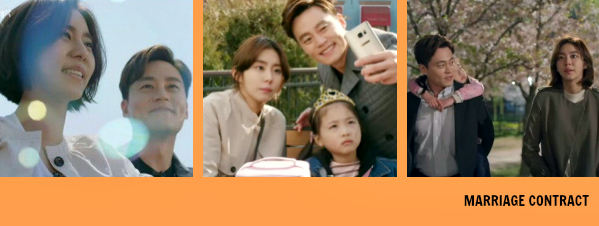
Watch this: On a rainy day. The rain will mask your tears.
I’m not normally a person who goes for tearjerkers eyes wide open, because sometimes it feels artificial to watch a drama in order to cry, and my taste generally leans away from purely emotion-driven dramas, especially the terminal illness ones. So it’s odd that I watched Marriage Contract, which was all of those things. I honestly can’t even remember why I did. Maybe it was Na PD’s fault for making me like Seo-jinnie enough to watch a melodrama? Yeah, let’s blame him.
I ended up liking it despite all those prejudices, even when it made me cry as much I thought it might, and even when it was not one of those fanciful dramas where terminal cancer has a magical cure. But that’s part of the reason I ended up appreciating it, though I sure wanted a magical cure while I was watching. In the end it was more realistic, and more powerful for sticking to its guns.
I think maybe there was just enough cute to keep me watching, mostly from Lee Seo-jin’s hilarious attempts to be a fake contract stepfather to UEE’s little daughter. I loved that he had to do internet research on how to befriend the precocious little girl who hated his guts. But then I stuck around because I became invested in UEE’s character, and was moved by her performance and the heartwarming family story. It may have been predictable, but it was no less moving because of that.
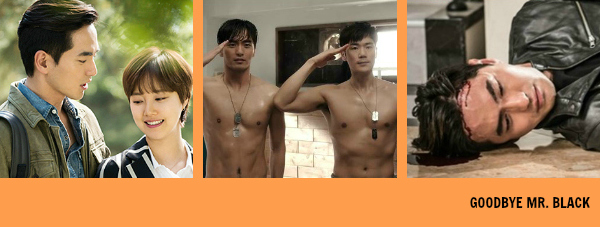
Watch this: Don’t bother.
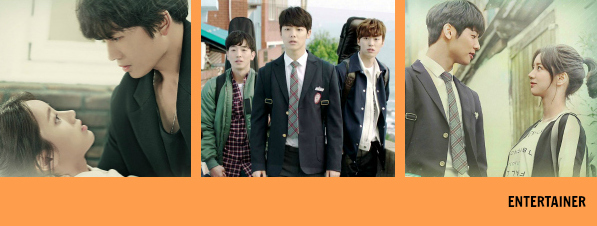
Watch this: On The Day the Music Died.
Entertainer is one of those shows I watched for no discernable reason—you know, the ones where you’re not really sure why you keep watching, but you do it sort of passively because you already started? It was cute at times, and at least it was earnest. I wanted to like it more, but Ji Sung and Hyeri were so mismatched and so vanilla as characters that I struggled to care about anything that happened to them, and romantically, I thought it was an utter waste not to pair Ji Sung with Chae Jung-ahn, and Hyeri with Kang Min-hyuk.
But the real problem with Entertainer wasn’t the lovelines at all, because this wasn’t a show about the romance. The problem was, I didn’t really care for the talent agent as a protagonist. It just wasn’t all that appealing a story, even when he was the scrappy underdog agent who got betrayed and had to start from nothing. So while the indie band was a ragtag group of boys you wanted to root for, their conflict never hit deep because they weren’t bros who grew up together with a lifelong dream of making it big—they were scouted and brought together, without having to do much—and every time they ran into a problem, Ji Sung the good agent saved the day.
The only thing that really moved me in the whole drama was Kang Min-hyuk performing his hyung’s lost song, and it made me wonder why the two brothers weren’t the main characters in the drama. I think if the show had just been about the band out in the streets before they ever got an agent, it might’ve been better—less star power, smaller story, but more of a true underdog tale. But then I guess that would be Shut Up: Flower Boy Band, and this drama will never in a million years be that drama.
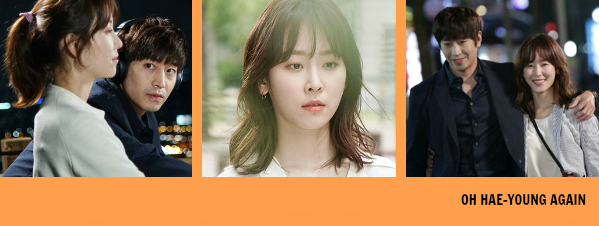
Watch this: On the day your frenemy gets promoted over you at work. Don’t forget the wine.
My memory of Oh Hae-young Again is that it was a melancholy show, which is inaccurate if I go back and look at it (turns out recaps are handy for that), because it was actually quite funny. I think I just have lingering resentment for the amount of suffering the characters had to go through, and us in turn. I tend to have a low tolerance for noble idiocy, and Eric’s character kind of drove me insane by pushing everyone away and always suffering alone for the good of no one. Stoic drama heroes must not be my thing.
But I have great fondness for Seo Hyun-jin in this role, because she was such a vulnerable mess of a person, and despite often cringing in mortification at everything she did and wishing desperately that she’d stop getting in her own way, she felt so three-dimensional and realistically flawed, and I was always rooting for her to scrape herself off the floor and make it through another day.
Maybe they thought making the heroine an over-sharer would make up for the hero being emotionally mute (that’s not how it works!), but their sizzling chemistry made up for a great deal when it came to the romance, and the show still stands out by the end of the year for that alone. I also appreciated the directorial flourishes and the moody style, and even though I often thought the heroine’s dilemma about sharing a name with a pretty girl was overblown, it was a good metaphor for a girl whose self-esteem was so far in the gutter that she’d lost her sense of self. It was worthwhile to watch her rediscover and love herself, only to realize that she’d been loved all this time.
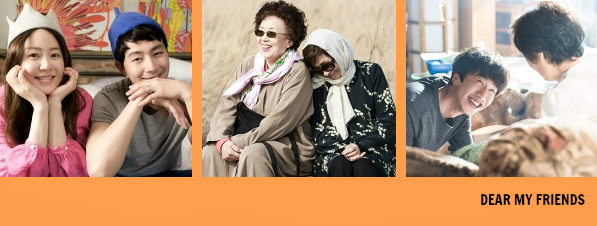
Watch this: The day before Mother’s Day. That way you’ll still have time to go get a card.
Dear My Friends was the drama that took all of my tears in 2016, and deservedly so. At times painfully realistic, often wry and witty, it was somehow simultaneously cynical and hopeful as a picture of life, family, and friendship. I’d never connected to a Noh Hee-kyung drama on this sort of emotional level before this (her dramas often feel like cold statues in a museum to me), but this one felt raw and very personal, and it pierced my heart. Rather violently. It’s not like any one mom or grandma in the drama was exactly MY mom or grandma, but in the total sum of all the various families portrayed, I recognized parts of myself and my parents and my grandparents, making the stories feel achingly real.
This show also featured some of the best acting performances of the year, particularly from Go Hyun-jung, with whom I identified to an inordinate degree, and the mother-son pair played by Kim Hye-ja and Lee Kwang-soo, who often had me bawling like a baby. And in a surprise twist, Dear My Friends ended up having one of my favorite romances of the year. The heartbreaking long-distance relationship between Go Hyun-jung and Jo In-sung kept me going even when the show got bleak, and I would’ve given someone my left arm to ensure their reunion.
With such a strong ensemble of veteran actors, the one downside was that every storyline felt like a short vignette that I wanted to see more of. But the matter-of-fact way they dealt with life and death, how everyone repressed their emotions like habit, the dry way that older people talk about monumental tragic events like they’re telling you what they want for dinner—it was all so perfect, and oddly funny, and true to life.
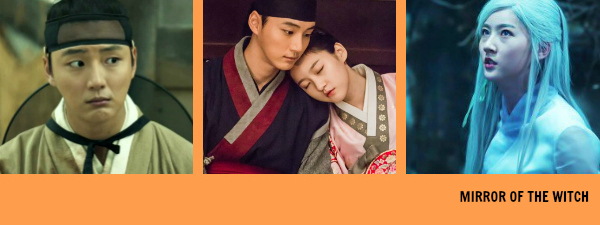
Watch this: On Opposite Day. Then the things that happened didn’t happen, and all is right with the world.
Mirror of the Witch was a pleasant surprise, and it’s definitely one of the dramas I’ll remember very affectionately from this year’s crop. It was beautifully shot, well-acted, and it had a very cohesive sense of magic that bound it all together and swept me up, like a satisfying classic fairytale with a cursed young princess, an evil witch, and the fate of two lovers sealed by a spell.
The one downside was that it always stayed a very young story, partly because of Kim Sae-ron, who was very good as the princess, but undeniably limited when it came to the romance. It was Yoon Shi-yoon who really carried the love story and drove the central conflict, with his stirring portrayal of an idealistic young man who would grow up to be Joseon’s great physician Heo Jun. I sometimes forget about Yoon Shi-yoon, but every time I watch his dramas, I’m surprised by the emotion he can convey with just a look.
I wouldn’t say that Mirror of the Witch dipped in quality at any point, which is something to be proud of, but the ending left something to be desired. It made sense and wasn’t at all a random curveball ending (which I appreciate, I swear!)—the story just didn’t utilize the magical premise it had at its disposal, and I thought it was a shame that we spent an entire drama fighting to save the princess from the curse, and then we didn’t get to save her from the curse. I wasn’t even that dissatisfied with the idea of a semi-tragic ending, because their sacrifices for each other weren’t meaningless. It just seemed like we had a spell for everything in this drama, except for the one thing we really needed a spell for. Ultimately it wasn’t so strong a misstep that it took away from how I felt about the show, because I liked the bittersweet resolution in the final moments. Maybe I just wanted to have my cake and eat it too.
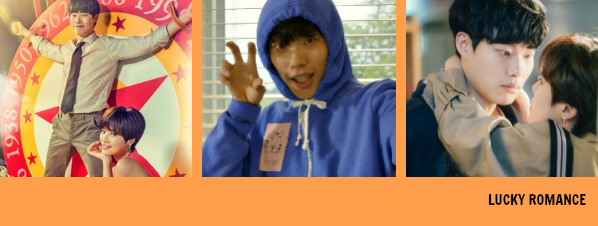
Watch this: On April Fool’s Day. That way you won’t get mad when the joke’s on you.
Oh, Lucky Romance, where did we go so wrong? I actually wish there weren’t elements of this superstitious rom-com that I did like so that I could dismiss it entirely, but Ryu Joon-yeol was so adorable as the geeky programmer who kept tripping over his feet and getting tongue-tied in front of his crush. It was worth some suffering to have seen that character. It would’ve been nice to like Hwang Jung-eum’s heroine just as much, but I could not for the life of me understand why she did anything.
Okay, I know why—she was so far gone in her superstition that she thought sleeping with a man would cure her sister—but I didn’t agree with a single thing she did, making it hard to do anything other than yell at the screen every time she got herself into trouble. I don’t mind a wacky, out-there character if there’s something relatable to latch onto, but every time I tried to root for her, she went and did some new crazy, illogical, superstitious thing, and I wanted to put that fortuneteller of hers in jail or at least ship him overseas before she got herself killed for believing a stupid curse. Because there was no actual magic involved, it seemed like a drama that desperately needed a shrink, not a shaman, to fix what was really wrong.
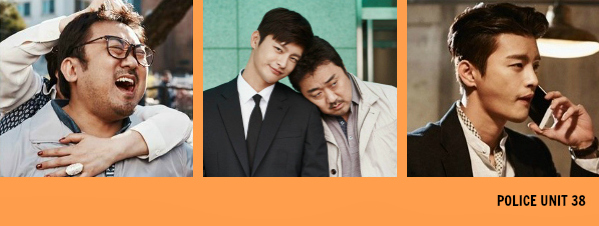
Watch this: On tax day. It’s the only day to celebrate not being a chaebol.
It was nice to come across a fun caper drama like Police Unit 38, which offered something different from dramaland’s usual fare. It was a fresh crime comedy that stuck to its strengths—swindling—and took us on a wild ride of scams and heists, where the heroes were modern-day Robin Hoods. It was hilarious to see the contemporary urban interpretation of the setup: the bad guys were evil chaebols, and the way they were cut down to size was to make them pay taxes like everyone else. There’s just something satisfying about stealing from spoiled rich people who think they’re above the law, which is why you can have an ensemble of criminals as your protagonists and never question that they’re the good guys.
The best part was the fantastic buddy-cop (er, criminal) dynamic between Ma Dong-seok’s nebbishy everyman tax collector, and Seo In-gook’s smooth-talking con artist. One was almost too naive and idealistic to survive in this world, and the other was so jaded and full of lies that it was unclear if anything about him was sincere. But they made a perfect odd couple, and got as many hair-raising turns in their relationship as any romance.
I do wish the overall pace of the series had been better, as I often found the episodes to plod along with too much conversation (there’s just only so much I want to see of the villains doing their armchair plotting). Naturally it picked up whenever we returned to the crew and put a con into motion; the one pitfall being that the bump-set-spike rhythm was often repetitive. This is probably why most heist capers are movies, though Police Unit 38 managed to keep us on our toes with clever twists the whole way through, which was probably its biggest accomplishment. Never has being lied to been so entertaining.
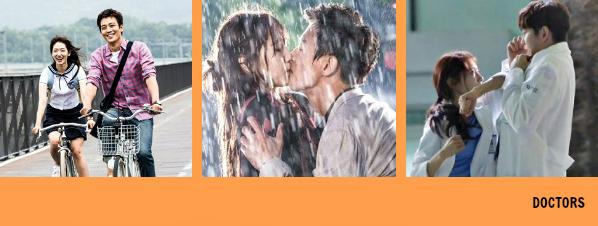
Watch this: On the night before a big test. It’ll remind you that even if you never studied up until now, you could still end up a surgeon.
This drama took a strong female protagonist and then proceeded to soften everything that was cool and different about her and turn her into a nice, normal girl. I can’t for the life of me figure out why, since I liked the sassy rebellious girl to begin with. Maybe I’m the weird one, but I felt like I was watching a show where the character progression was going in reverse. The thing is, Doctors was a light, easy-to-watch workplace drama that hit all the expected marks and breezed by. But it was so uneventful plotwise that I’m wondering now how they filled all those episodes. The character interactions were amusing, but there was no core conflict that drove anyone anywhere.
I also never warmed to the entire romance with teacher Kim Rae-won, who always acted like he knew better than Park Shin-hye and never changed anything about himself, but always wanted her to do all the growing up and changing. Which I didn’t get, because she’d already made something of her life and become a skilled surgeon, against the odds. I thought the most interesting part of the story would’ve been seeing how that teenage gangster turned her life around and put herself through med school and slaved her way through internships, but we just skipped right over the good stuff to watch her be successful, and where’s the drama in that?
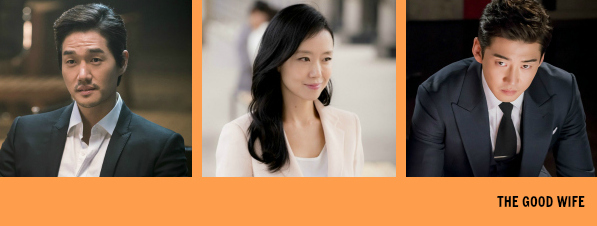
Watch this: On New Year’s Day. So that you can make a resolution and break it.
I’ve never seen the original American series, but I checked out The Good Wife to see Jeon Do-yeon’s return to television and found it striking—it was visually cold and stark, and narratively repressed in a simmering-under-the-surface way. The characters were intelligent, all with conflicting agendas and little secrets, and the love triangle was really engaging. Even the law seemed realistic, thanks to the original show. I do wish that I liked the heroine more as a person, though I did root for her the whole way through. I just often didn’t know what she was thinking, and that got frustrating after a while. But her world was glossy and cool, and it made lawyering seem kinda badass. Or maybe that was just Nana’s job at the law firm.
The one thing that really bugged me about the adaptation is that it ended like it was a season finale. I was so onboard the Yoon Kye-sang train (who wouldn’t be?), but when they pulled out that ending where the heroine was inexplicably back with her husband, I shook my fists in the air and said ragey things. It was like she totally reverted to the life she had before, and even if she hadn’t broken up with her boyfriend (also problematic), that ending felt like we were going back on all the progress she’d made as a character. Hell, I would’ve preferred it if she’d pulled a Kelly Taylor and chosen herself; at least that’s a choice I can get behind.
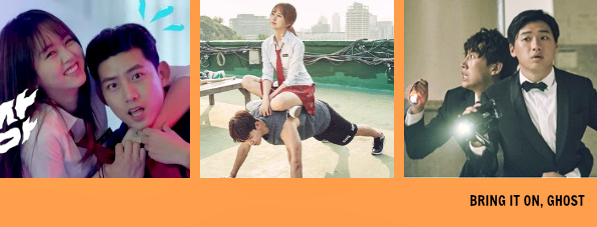
Watch this: On the Day of the Dead.
When you have a premise as quirky as an exorcist becoming roommates with a ghost, you’d think that the resulting show would be really out there. But my biggest disappointment with Bring It On, Ghost is that it was safe and conventional, and never really did anything interesting with the initial concept, which was rife with potential human-ghost hilarity and afterlife intrigue. I do remember lots of funny beats, mostly thanks to the geeky bromance between the GhostNet boys. And the romance ended up being much cuter than I expected. But my general feeling is that the show lacked zing, and felt too predictable and slow despite the fun that was advertised.
Taecyeon was undeniably a big reason why I never connected fully to the show; he was actually cute in the rom-com parts, but when his character had anything to angst about, I cringed pretty hard. The one part of the romance I really enjoyed was when Kim So-hyun got amnesia and forgot all about him, turning the tables and making him chase after her for a change. That was charming, and I wished that it had been a larger part of the story instead of popping up at the very end. If the show had just focused more on developing the characters and less on the procedural ghost-hunting, it might’ve clipped along at a decent pace, instead of making me think I’d have to die and come back from the dead before seeing the plot advance.
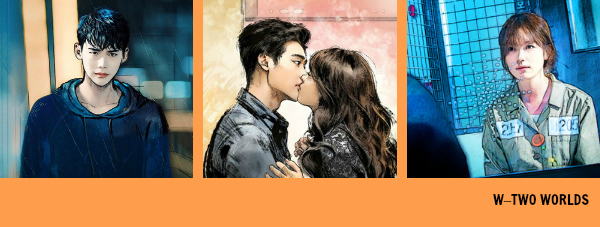
Watch this: Yesterday. You just don’t remember because this isn’t the real world and you’re not real.
“Lost Memories” (W–Two Worlds OST)
Audio clip: Adobe Flash Player (version 9 or above) is required to play this audio clip. Download the latest version here. You also need to have JavaScript enabled in your browser.
Despite sending me on a roller coaster ride of violent emotions, W–Two Worlds still remains one of my favorite shows of the year. It’s utterly flawed and some of the problems actually still get my blood boiling (*deep, calming breaths*), but when it was good, I thought that it could rewrite what fantasy K-dramas could be. It was new. It was mind-blowingly inventive. It was downright sparkly.
I was mad for the premise—comic book hero vs. comic book creator, in the ultimate battle between god and creation, predetermination and free will. And even though those themes seemed like too much to expect from a drama, it surprised me by tackling them head-on, in full-blown sci-fi, Matrixy glory, complete with amazing art design and slick direction. It was geek heaven, and I was so ready for W to be the best thing since sliced bread.
Unfortunately, bread continues to be more awesome than W, because the show committed the cardinal sin of not knowing what in the hell it was all for. The writer was so focused on establishing the worlds and shattering our expectations with twists that she never actually mapped out where the story would go from its epic beginnings, and what it meant in the first place that two parallel worlds existed and one was a manhwa that had come to life. Why had this one come to life, and what made this hero so special that he became self-aware and could be a real boy?
It seemed lazy of the writer not to answer the fundamental questions she’d raised, because I thought they were easily answerable given the world-building that had been done; but it’s like she’d changed the rules so many times that she lost track. Do you think she ran out of Post-Its? I’m not just going to fanwank that mythology explanation for her, because I deserve real answers, okay? Despite all that, I had the best time theorizing and dissecting this show as it was happening, and flaws and all, W raised my standards for what I want out of a good drama… even if it failed to meet the very standards it set.
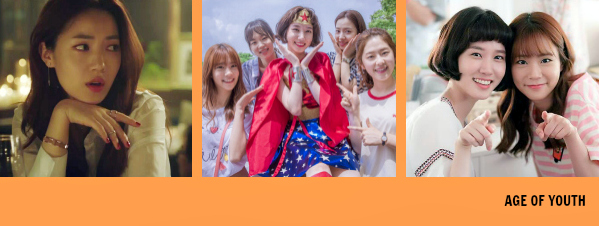
Watch this: On the day you get dumped. Who needs boys when you’ve got friends?
Age of Youth was an unconventional drama that often gave me tonal whiplash. For the most part it was an upbeat story about friends, but it could go suddenly eerie and dark, then bleak and depressing, then light and sweet, then heartwarming, and then back to spooky again, all without any warning. It always left me vaguely on edge, because I would be waiting for the rug to be pulled out from underneath me in every scene. I think this writer got a sense of satisfaction in making us think that a serial killer could pop into the sweet coming-of-age drama at any moment and start a killing spree—I’m not even exaggerating, because I really thought someone might be murdered the whole time I was watching this.
You’ll laugh at me now, of course, seeing as how that was an overreaction. And if you asked me to describe the show, I’d use mostly happy words, like: Five very different roommates come to accept and love each other, and become true friends. Sounds so sweet! It’s just that a very big part of watching Age of Youth is the tonal dissonance of the show, where everything is off-balance and you’re left to wonder very dark things about the unanswered questions. So I’d almost call it a mystery before a coming-of-age drama, except I wouldn’t call it a mystery at all because it’s so much about the girls overcoming big personal obstacles and growing up. I give up trying to classify it. What I can say is that it was so weird that it intrigued me, and I came to like it, weirdnesses and all. It was surprisingly fresh and charming and fun. Yunno, whenever I wasn’t convinced that death was around the corner.
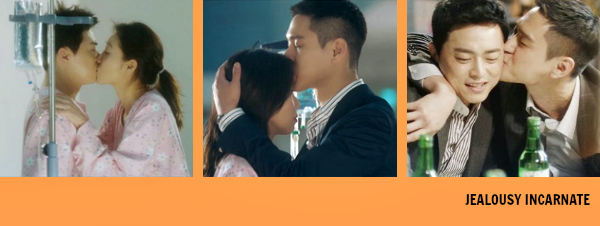
Watch this: On a day that ends in Y.
I never laughed as much all year as I did while watching Jealousy Incarnate. It’s a show that impressed me by doing comedy right—stylishly, with wit and perfect timing—and I could’ve easily watched another 24 episodes and asked for more. I was endlessly amused by the sharp comedic banter, where everything was buried under five layers of subtext and nobody said what they meant, so that minutiae became meaningful, like a secret code language spoken by emotionally stunted people. I loved it.
I think there was just a magical synergy in the writing, directing, and acting, because the dialogue was clever, the delivery was dry and side-splittingly funny, and the directing elevated it all with witty touches and visual gags, making it seamless. The show always subverted my expectations in every interaction—you think a conversation is going left, and characters suddenly veer right—and the surprise is as pleasing as the joke itself.
Jealousy Incarnate was in no way a one-man show, but Jo Jung-seok really took off and ran with his character, and he made me think that nobody else could’ve played that infuriating lovable manchild so pitch-perfectly. One major disappointment in the drama is that the world was set up with a whole host of fantastic side characters who should’ve gotten meatier stories and lots of development with episodes to spare, but they got shafted for the central loveline. I was sad that we never got to see the ins and outs of the Rak Pasta tenants becoming one big, mixed-up family; we know they did, but I wanted to be there for the nitty gritty, because I loved the family stuff way more than the news broadcast stories.
One of my favorite parts in all romance stories is when a burst of jealousy betrays a character’s true feelings, cutting past all the bullshit, so I guess I shouldn’t be surprised that an entire drama all about jealousy would end up at the top of my list for 2016. The jealousy was extreme, to be sure, and immaturity probably reached new lows (hilarious, awesome lows), but it also showed us that sometimes, pettiness is brutal honesty, and admitting jealousy is saying “I love you.”
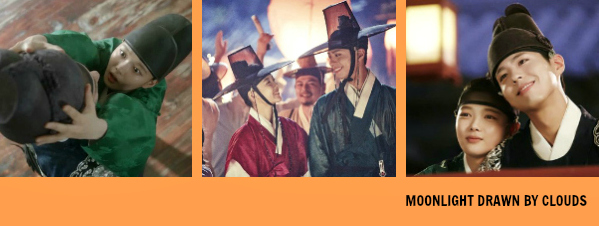
Watch this: On the first day of snow. Then you and Show will live happily ever after. Why? I don’t know. Those are just the rules of dramaland.
Moonlight Drawn By Clouds was one of the best drama-watching experiences of the year for me, because I just bought into it wholesale—the jokes made me laugh, the romance made me swoon, the idealism clenched my heart, and I cried on cue every time the drama wanted my tears. I loved the Joseon-era romance told with a modern sensibility, with tongue-in-cheek jokes that only 21st-century viewers would get, adding a fun layer of meta to everything. And it was deservedly a star-making, career-defining turn for Park Bo-gum, who turned a familiar crown prince archetype into a romantic ideal and a pop-culture icon; Park Bo-gum is to princes what Gong Yoo is to baristas. It could have been a perfect little drama.
What I realized after Moonlight Drawn By Clouds is that I have a really strong love-hate relationship with this PD-writer team, who also did Who Are You–School 2015. I really love the director’s emotional and narrative sensibility and visual style. The music always makes me feel something. I love the way these writers portray youth, and the way each episode always packs an emotional punch. But I totally hate the way they resolve stories, because their idea of closure is bullshit. I’m never satisfied at the end, and that’s especially maddening in the case of Moonlight, because I loved it so.
It’s not even an argument for historical accuracy, since the story plays with history from the start; I just wanted narrative closure that made sense, because when your hero is a real prince who died young, you have to explain how you’re getting around this very big problem. The thing I don’t understand is, the source novel does this, but the drama just chose not to. Did they get tired? Did they not finish the book? Because if you’re going to deviate, which is a totally valid thing to do in an adaptation, you should maybe have a reason and an explanation prepared. It just seems like the drama skipped forward to the ending they wanted without showing us the roadmap for how they got there. I mean, you’d think it would be obvious—if you don’t take me with you, I’m not there with you. And if I have to write fanfiction in my head to explain your ending, you’re doing it wrong! At least I know it’s safe to read the novel? Guess I know what I’m doing over Christmas.
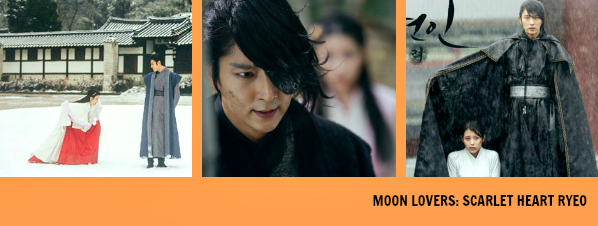
Watch this: Every day in five-minute increments. That way, you’ll never notice how disjointed it is.
Watching Moon Lovers: Scarlet Heart Ryeo was a huge source of entertainment for me, because every week javabeans, HeadsNo2, and I would discuss the show and everything it was doing so horribly wrong, and it became a fun weekly activity. Sometimes you have to make your own fun!
I did like a lot of the elements of this story, in particular the misunderstanding and rivalry between princes, the tragic tale of a lonely king who lost the very things he thought power could give him, the drama’s revision of history, cleverly filling in what could’ve happened between the lines of historical record. It’s cool stuff, led by a charismatic Lee Jun-ki as the complex hero, so you’d think that the result would be decent. Good, even.
But man alive, was it a mess. The directing was bad, the editing was screwy, the acting was uneven because half the cast didn’t belong, and the writing was especially infuriating, given the potential (not to mention—hello, you have source material!). I don’t know the original, but I would’ve fixed the adaptation by having fewer princes, because this show suffered from trying to tell too many stories and failing to do any of them justice. Why not strip away all the dead weight and tell a lean, emotionally charged story where your characters don’t suddenly disappear from the drama and then reappear with a personality transplant?
Sadly, it was just a case where having all the time in the world to pre-produce could never have fixed what was really wrong in the first place—a heroine you can’t connect with emotionally, a writer who never quite landed any of the emotional beats with a satisfying punch, and a director who wanted epic but didn’t know how to get there.
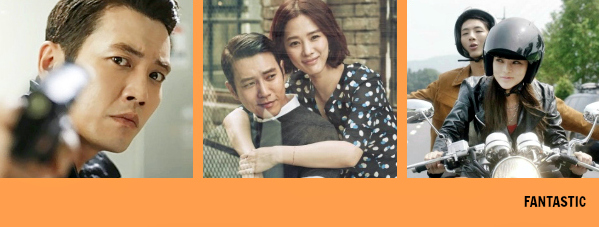
Watch this: On a sick day. You’ll suddenly feel like your cold is no big deal.
There were aspects of Fantastic that I liked a great deal; it just never stuck with me and really moved me, and I’m not sure why. I liked the hilarious foot-acting star of the universe (even though I could never shake the thought that he was Song Seung-heon in real life) and the awesome cancer doc. I appreciated the (mostly) upbeat portrayal of cancer—living with it, not just dying of it—and the friendships were very loving and genuine. Perhaps I never fully warmed to the prickly heroine, who had convinced herself she’d rather die alone and pushed people away, and then changed her mind, and then changed it again. And the romance was so chaste that it actually confused me, because I was filling in blanks that I later realized had been premature. I mean, not only are you both in your late thirties and already living together, but you might die of cancer, so what are you waiting for?
I mostly watched this on the recommendation that I’d enjoy the Park Shi-yeon/Ji-soo noona-dongsaeng loveline, which I did. But it was a minor plot that could’ve used some more development, and by the end I wished their story had been given more attention. I did really love Park Shi-yeon’s arc from a downtrodden daughter-in-law to a strong, independent woman, and I lamented the fact that I wasn’t watching the spinoff drama where she was the main character. Her story and the trio of girlfriends would’ve made for a great show. So yeah, I guess it really was the heroine I didn’t connect with, because if I could’ve turned her into a supporting character in her own drama, I would’ve done it in a heartbeat.
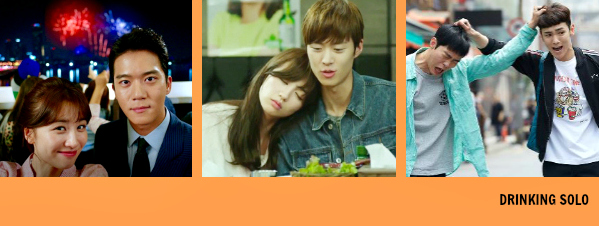
Watch this: On a day your unappreciative boss yells at you for something that wasn’t even your fault.
I was pleasantly surprised by Drinking Solo, which turned out to be a well-written slice-of-life comedy that often moved me. The stories were small, focusing on the everyday concerns of students and teachers preparing for the civil service exam, and the conflicts were so down-to-earth and relatable—being too poor to eat what you want, feeling adrift and lacking direction in life, wondering if your friends would move up in the world and leave you behind.
Unfortunately the central romance left a lot to be desired, partly because it lacked proper development, and partly because Ha Suk-jin’s character was such a pompous ass (at least he was a funny character who got his comeuppance, so I never resented him completely). But the romance was never the draw of this show for me, so I didn’t feel very disappointed. I loved the sitcom feel of just following one quirky character’s crazy day after another, and finding the humor and pathos in their mishaps and petty fights. I have a particular soft spot for the three Norayngjin Idiots, who were the most bumbling and hysterical set of friends I encountered all year.
The antics were outlandish, but the world was so real—almost too real that it hurt sometimes—and the conflicts landed with the audience because there were no easy answers or shortcuts offered to anyone. Dramaland is so full of chaebols and fantasy that sometimes it’s a breath of fresh air to encounter a drama where average people struggle to live well and find their path, and when a show can go a step beyond that and find the humor in it, it speaks to me and leaves a smile on my face, long after it’s over.
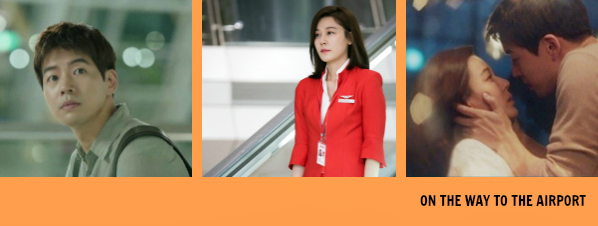
Watch this: On the day you fly home for the holidays. It’ll make waiting in the TSA line a lot more bearable if you consider it a chance to run into your soulmate.
This was a year I tried out more melodramas than usual, and I was glad that I gave On the Way to the Airport a chance, even though I can’t say I liked it all the time; but it was such a visually moody drama that it’s worth a watch for the style alone. I checked it out initially to see Lee Sang-yoon, but ended up continuing because I wanted to know what the heck Jang Hee-jin’s deal was, and why she was such a terrible mother. They made me SO curious about that in the beginning, and though it got me watching, I was a little miffed that the explanation was so mundane. I was expecting a twist, or at least one better than what we got.
They made it impossible not to root for the adultery, given how terrible the spouses were, and I did root for the central romance the whole way through. They really drove home the point that these two were soulmates who would always end up in the same place at the same time, like Fate was just hellbent on making it happen. Sometimes Kim Haneul’s character was frustrating (basically whenever she was in a room with her husband), but I thought her journey toward independence was worthwhile and uplifting. The real star of the drama is the director, who made every meeting seem fated, every hand graze momentous, and that kiss… like we’d been waiting a thousand years for it to happen.
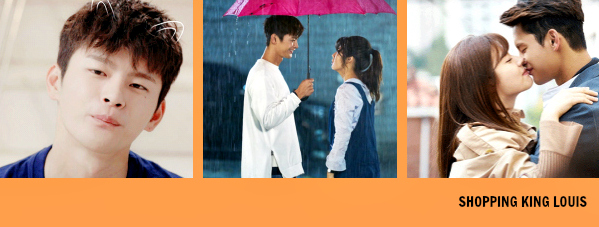
Watch this: On the day you max out your credit card buying shoes.
Watching Shopping King Louis was a little like escaping to Neverland with Peter Pan—it was a fantasy world where no real grownups existed, everyone was good at heart, and problems could be solved with pixie dust. As a comedy it was successful, since I laughed at all the ridiculous antics and nutty situations; but the lack of realism kept me from fully engaging with the story beyond the laughs, since I couldn’t take anything seriously. I was always under the impression that our characters were more than a few fries short of a Happy Meal, and that sometimes worried me. How about, don’t leave your life savings in the hands of a shopaholic amnesiac!
But Seo In-gook and Nam Ji-hyun were precious little puppies, and they gave their characters a childlike wonder that was impossible not to find cute. Their sprightly charm carried the show, which could have caved so easily with such a flimsy plot and ridiculous villains, if you can even call them that. I can’t say that Louis’s world is a world I know, but I guess it can’t be that bad a place if shopping is considered a life skill there, and if Louis has his Bok-shil.
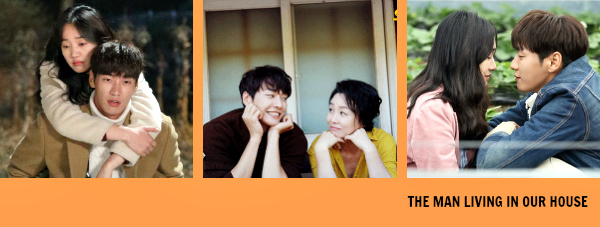
Watch this: On the day after you pull an all-nighter. You’ll fall asleep after the cute start and you won’t have missed much by the end.
The premise of The Man Living in Our House had potential—admittedly very wacky potential, but that can get you pretty far in rom-coms. A younger man claiming to be your new stepfather is a pretty strange way to begin a romance, which is why I was intrigued from the start. Coupled with his potentially shady past and confusingly tender demeanor, the stepdad made for a really different kind of rom-com hero, and I enjoyed the funny awkward relationship that resulted with prickly Su Ae, who didn’t know if she should treat him with respect or suspicion, and ended up bumbling on both counts.
It’s too bad that the show ran out of plot long before the end, giving us a very uneventful second half where lots of stuff happened, but nothing really happened. The supposedly Very Important fight over the land turned out to be rather meaningless, and bad guys just sort of stopped being pesky and were ultimately forgiven, who knows why. What about all of the life-risking and romance-thwarting they were responsible for? Where is my pound of flesh, goddammit? I don’t know that I would’ve cared so much if the romance had been better plotted, but here again they ran out of story too early, and by the time the couple had denied, confirmed, denied, confirmed, and reconfirmed their love, I was totally over it.
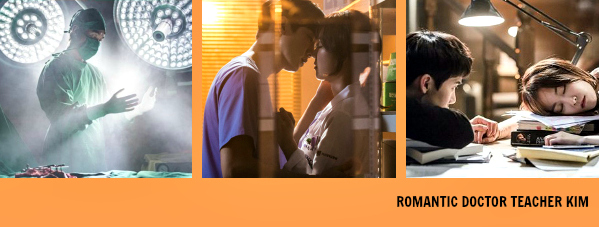
Watch this: On Friday the 13th. It’s when the weirdos come out to play.
Romantic Doctor Teacher Kim really started with a bang (or more accurately, a hot, rewind-worthy kiss) and sucked me in with its complex, damaged characters who have years of tangled trauma built up inside. That’s really what keeps me watching, because the basic framework of the plot is regular medical show stuff—death, mayhem, doctors—with the requisite hospital politics gumming up the works.
But the twist is in the show’s tone, which is off-kilter in a great way, sometimes making the remote hospital seem like a house of horrors, and making surgeon guru Teacher Kim seem alternately like a hero, and then a madman. You’re never quite sure what goes on in the hospital, and who’s in on it, and why no one except for Yoo Yeon-seok seems to think it’s weird. I love that, because everyone who works there is strange, but he’s made to feel like the weirdo for thinking that they’re weird. I really hope the show doesn’t turn normal on us anytime soon, because dramaland’s got enough medical shows to fill all the days of the year, but very few of them are as entertaining as this one.
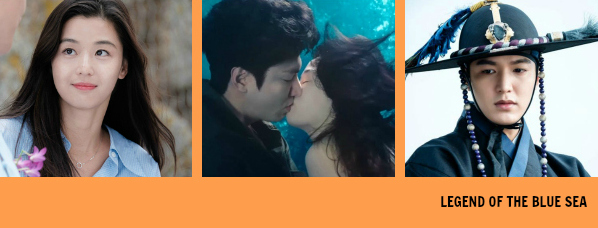
Watch this: On Christmas Eve. One last chance to ask Santa for new legs and a happy ending loophole.
I do think that of the currently airing shows I’m reviewing, Legend of the Blue Sea is the one that has the highest risk of disappointing me and negating my generally positive feelings toward it, not because I think it’s going to dip in quality, but because fantasy dramas have a higher standard to meet on the satisfying-ending front. I’m optimistic though, because so far I’m liking the direction of the story, and now that we know some of the rules of this universe full of mermaids and doppelgangers and alternate parallel worlds, I’m more invested in the overall picture.
I wouldn’t say it’s a crack drama, because it lacks a certain sparkle to take it over the edge. Perhaps it’s because it retreads a lot of the trail that You From Another Star blazed, or because the romantic chemistry hasn’t ever gone beyond cute to sizzling territory. But I do think that it’s telling its own story now, and it’s one that I enjoy. Life-risking romance has a way of earning your empathy like that.
I expected to be watching this primarily for Jeon Ji-hyun’s comedic turn as a mermaid on land, and though she is as hilarious as I anticipated, I’m surprised that Lee Min-ho’s character is the one I like more. Maybe the human is the easier character to relate to here, but he’s cracking me up with his jealous boyfriend antics and his lack of cool when it comes to the mermaid. Also, his Joseon-era counterpart is really swoony. Is it the uniform? The ardent loveline? I don’t know, but whatever it is, it’s working.
I think I’m actually going to welcome some angst in this show, because that’s part of what makes the Joseon timeline so affecting, and what the mermaid lore really amplifies thematically in a natural way. It seems so cruel to be fated to love only one person your entire life and then to die without that person’s love to literally keep your heart pumping, but boy is it a good corner to back your characters into.
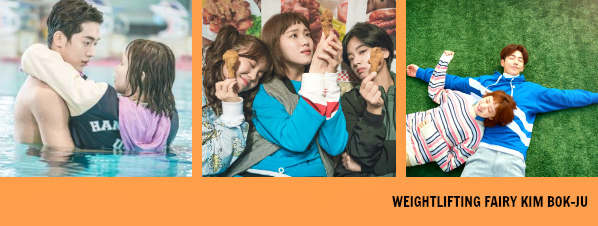
Watch this: When you’re having a bad day. You’ll thank me later.
Weightlifting Fairy Kim Bok-ju hits all of my youth drama sweet spots and makes me so happy, just by being its sweet, earnest little self. I absolutely love that this show makes me feel every awkward coming-of-age moment deep in my bones, because this is how I remember first love—embarrassing, fluttering, foot-in-mouth, heart-in-throat. You never say the right thing or dress the right way, and you never notice that dorky best friend with braces (in my mind, Nam Joo-hyuk’s character has big metal braces—wouldn’t that be better?). I like that it’s an uncomplicated pick-me-up drama full of everyday problems that feel organic and universal, with a levity that feels sunny and hopeful rather than juvenile.
At the heart of it is the lovable heroine Bok-ju, played by Lee Sung-kyung, whose bumpy road to self-discovery is as funny as it is relatable. It’s just nice to come across a regular girl in dramaland once in a while—someone who’s unsure of herself at twenty and facing regular problems like loving an unattainable boy from afar. The natural relationships, the adorable bickering friends-to-lovers romance, the lovely pastel color palette of the show—they’re all just part of what I love about it. But the moment when Bok-ju was on cloud nine because her first crush was in full bloom, and she said she was happy to have been born a girl? Straight to the heart. Me too, Bok-ju. Me too.
~
And another year comes to a close! As always, thanks for reading and watching with us all year long, and for being the best community ever. May 2017 bring us more dramas to love. Cheers!
RELATED POSTS
- 2016 Year in Review, Part 2: The doctor is in (javabeans’ review)
- 2016 Year in Review, Part 1: The Bean Count
- 2016 Beanie Awards: Vote for your favorite dramas of the year
- 2015 Year in Review, Part 11: Editors’ Picks
- 2015 Year in Review, Part 10: Sweet heroes and fierce heroines (Saya’s review)
- 2015 Year in Review, Part 9: Drama tasting notes (odilettante’s review)
- 2015 Year in Review, Part 8: Santa goes Zen (Santa Claus’ review)
- 2015 Year in Review, Part 7: For the responsible addict (dramallama’s review)
- 2015 Year in Review, Part 6: A sweet year of dramas (LollyPip’s review)
- 2015 Year in Review, Part 5: The fifth wheel in dramaland (gummimochi’s review)
- 2015 Year in Review, Part 4: The five stages of grief (HeadsNo2’s review)
- 2015 Year in Review, Part 3: Five by five in 2015 (girlfriday’s review)
- 2015 Year in Review, Part 2: Giving 2015 a hand (javabeans’ review)
- 2015 Year in Review, Part 1: The Bean Count
- 2015 Beanie Awards: Vote for your favorite dramas of the year
Tags: 1 show to rule them all, Age of Youth, Bring It On Ghost, Cheese in the Trap, Dear My Friends, Descended From the Sun, Doctors, Drinking Solo, Entertainer, Fantastic, featured, Goodbye Mr. Black, Jealousy Incarnate, Legend of the Blue Sea, Lucky Romance, Marriage Contract, Mirror of the Witch, Moon Lovers: Scarlet Heart Ryeo, Moonlight Drawn By Clouds, Oh Hae-young Again, On the Way to the Airport, Police Unit 38, Romantic Doctor Teacher Kim, Shopping King Louis, Signal, The Good Wife, The Man Living in Our House, Weightlifting Fairy Kim Bok-ju, W–Two Worlds, year in review, year in review 2016
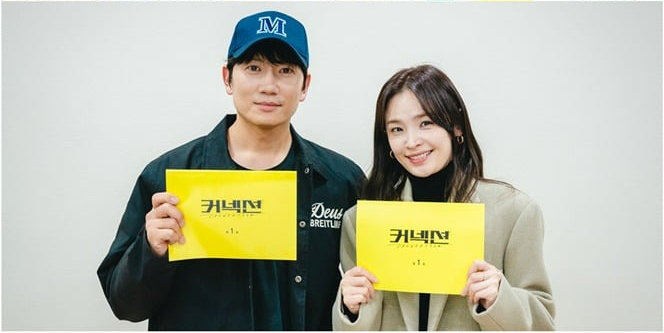
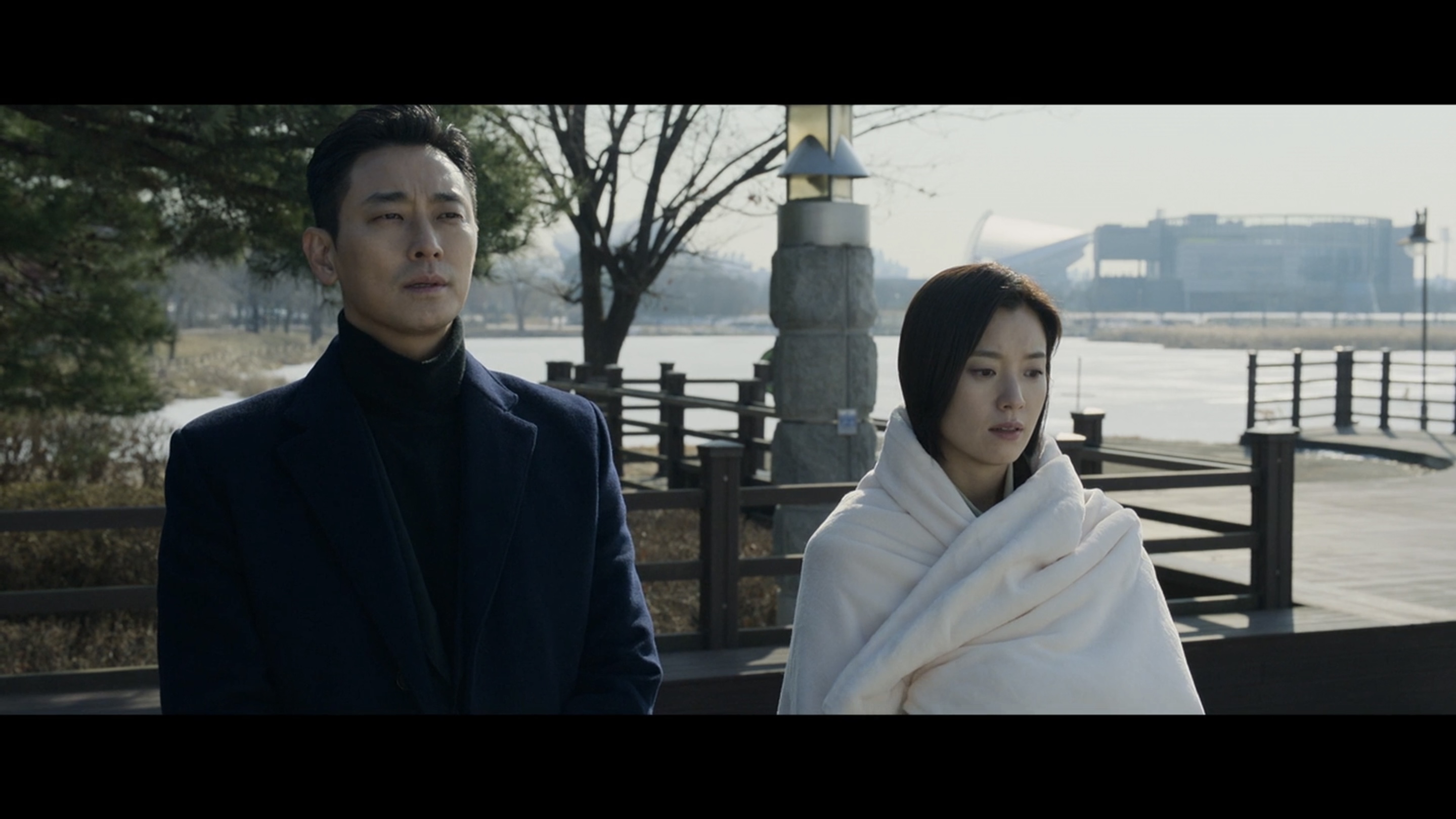
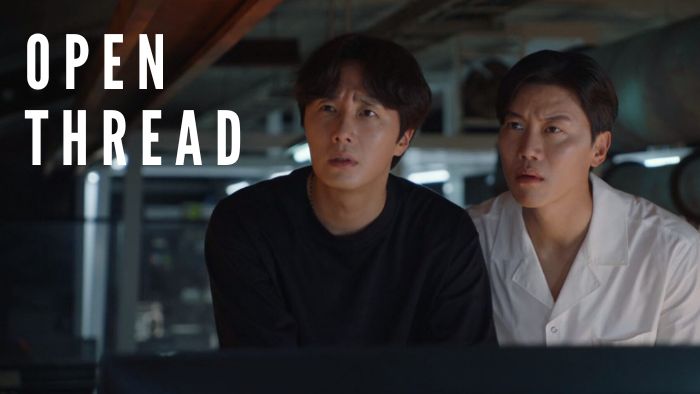
![[Cast Away] A psychometric marries his enemy to foil her plans](https://d263ao8qih4miy.cloudfront.net/wp-content/uploads/2023/09/castaway_header1.png)
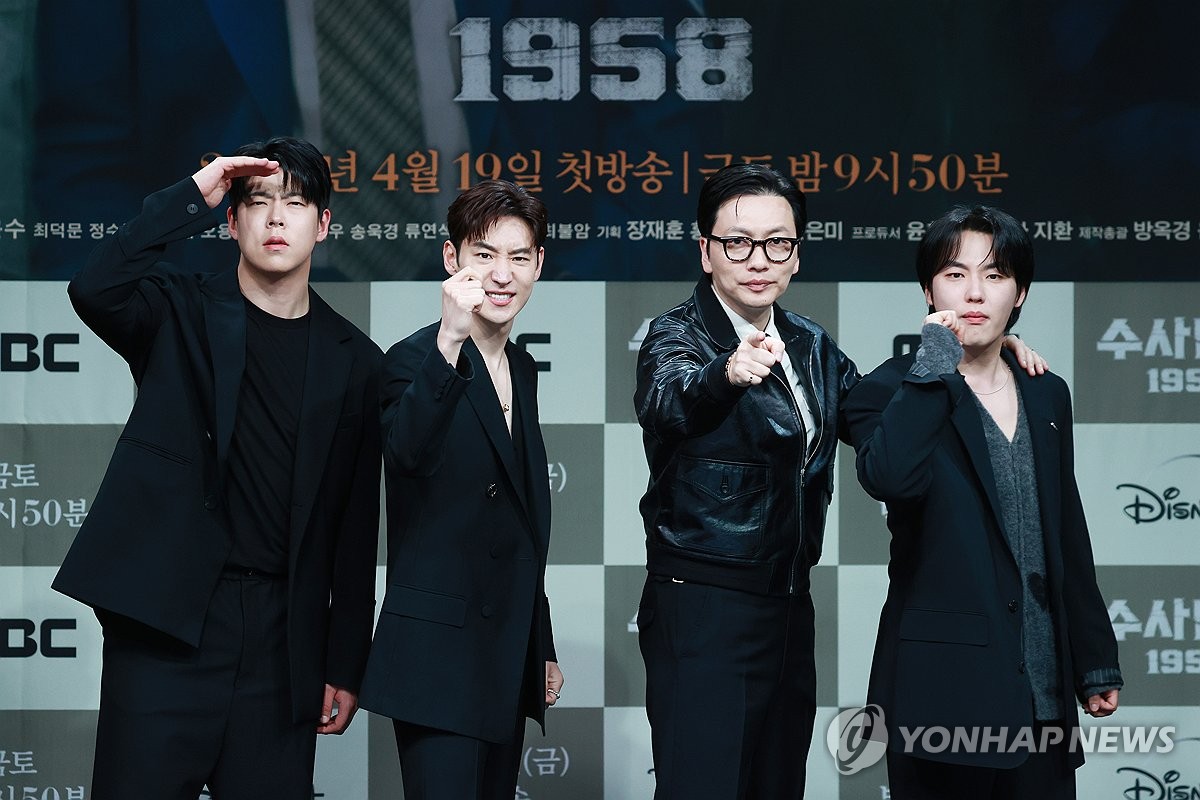
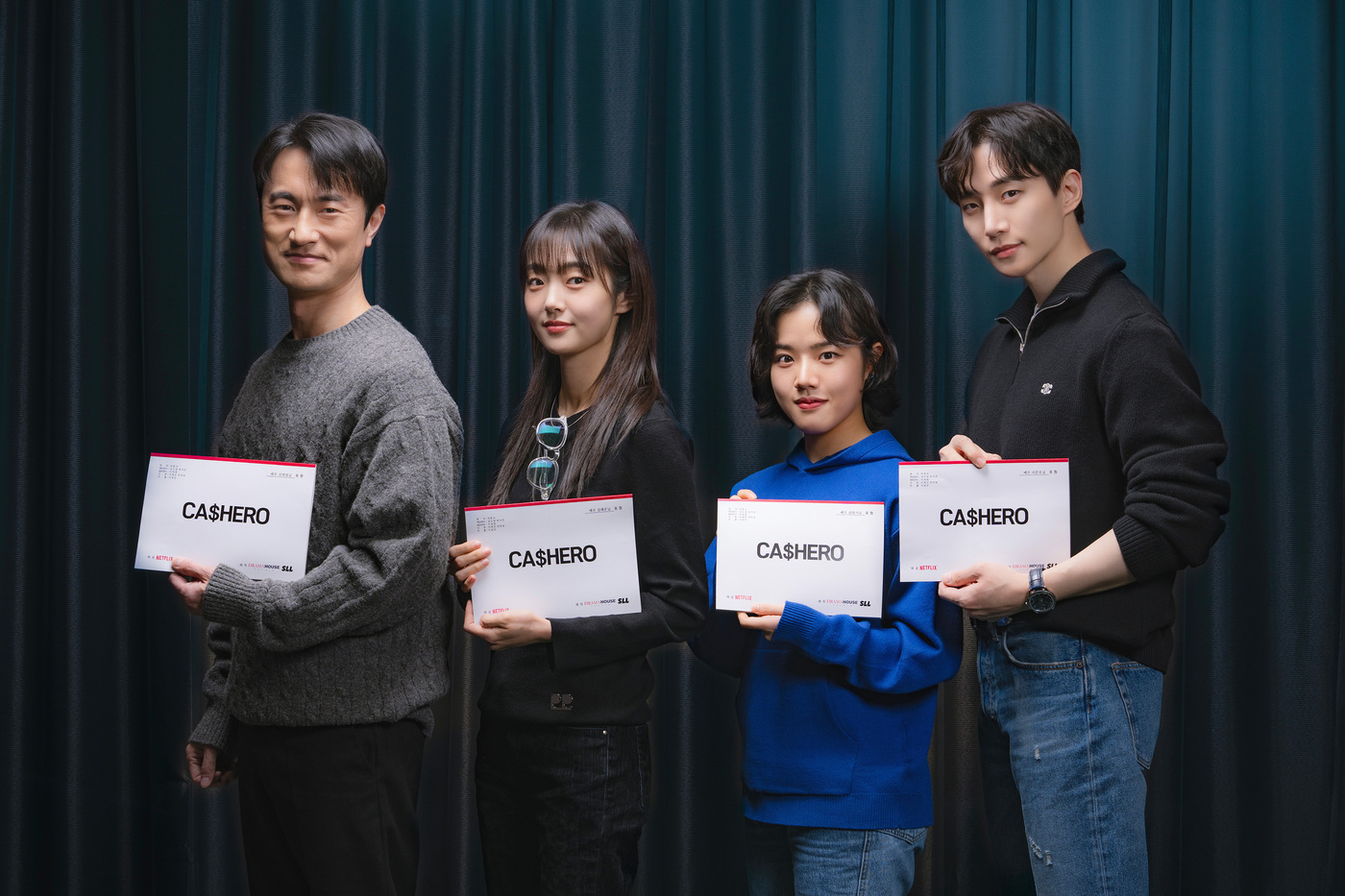
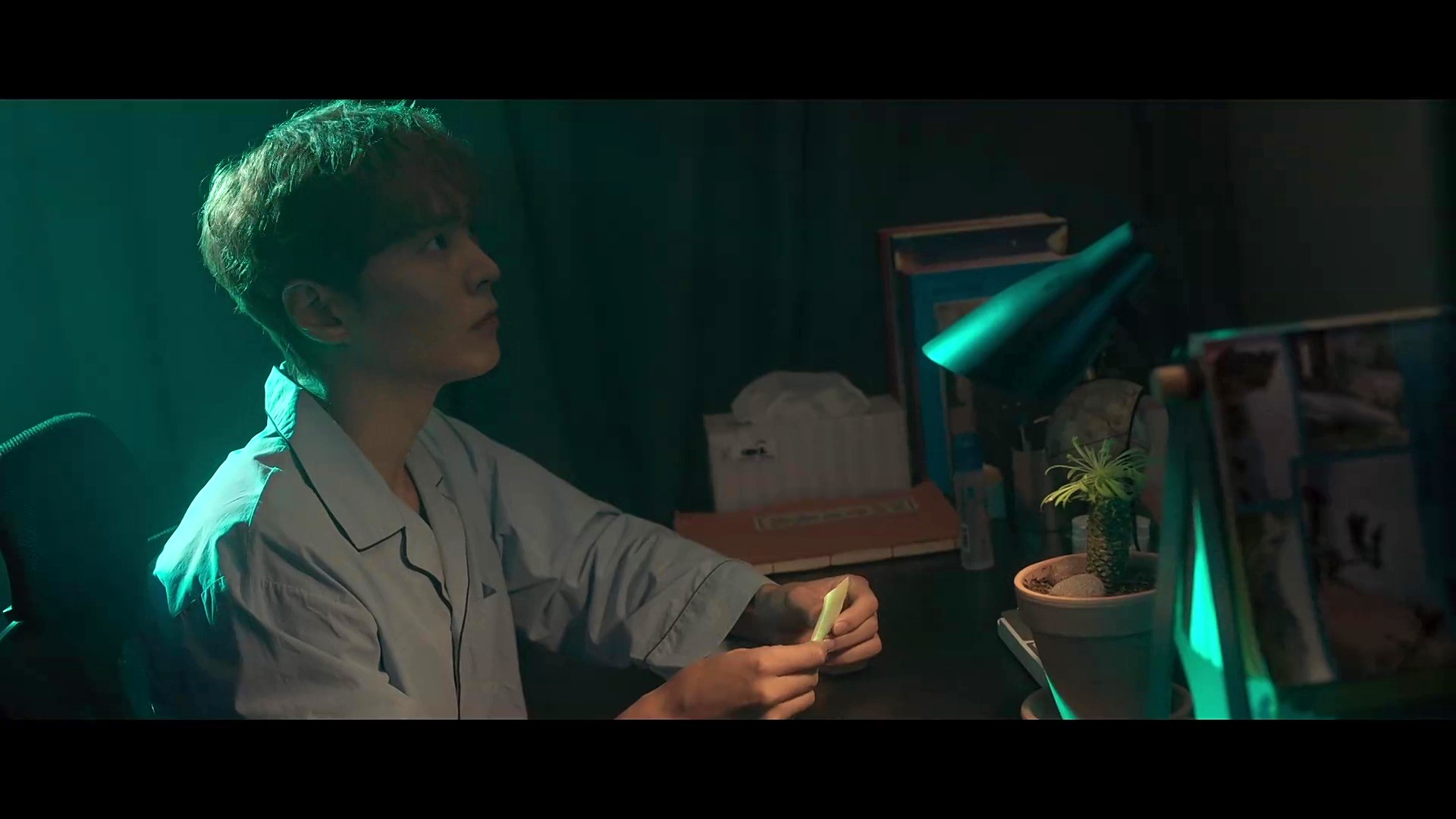
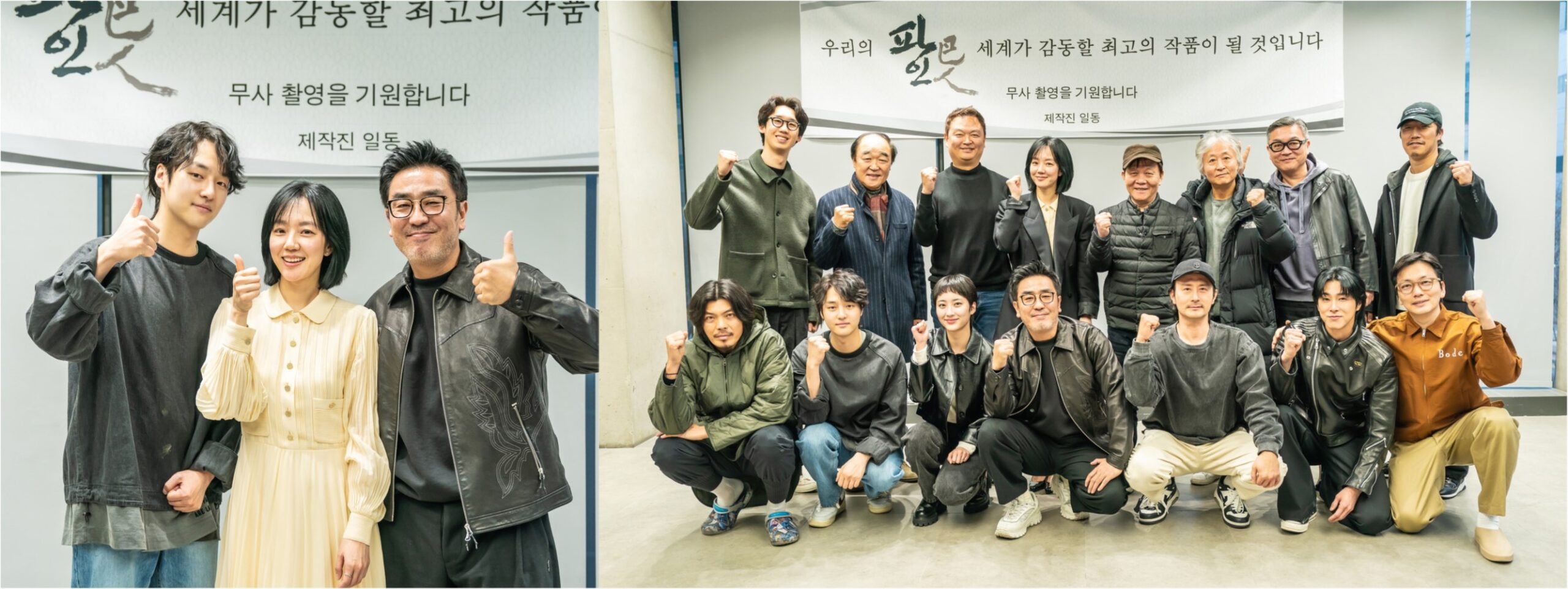
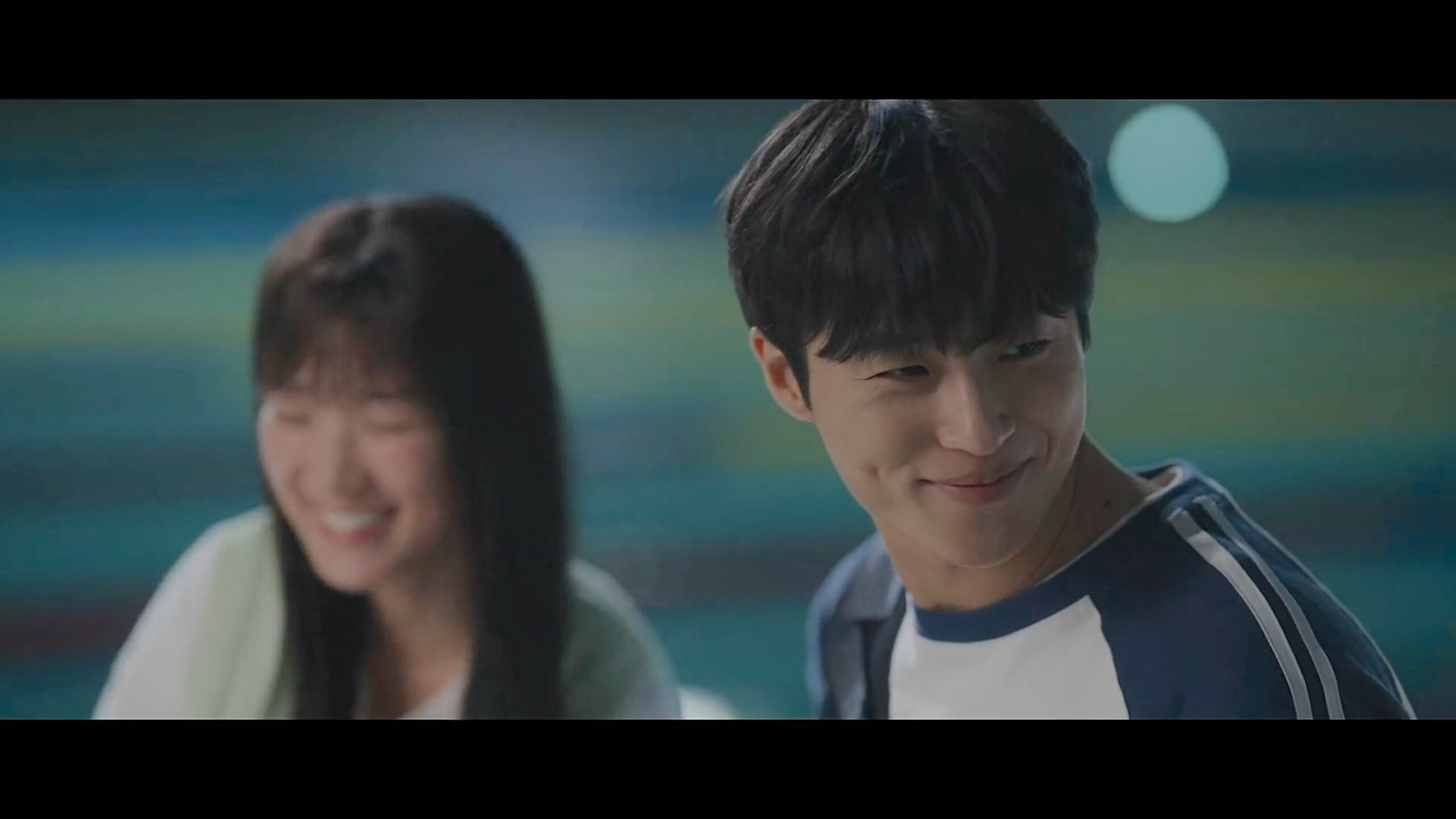
![[Beanie Recs] Dramas about fangirling](https://d263ao8qih4miy.cloudfront.net/wp-content/uploads/2022/05/BeanieRecs.jpg)
Required fields are marked *
Your email address will not be published. Required fields are marked *
51 joja
December 18, 2016 at 2:44 AM
I can't seem to find Neighborhood Lawyer Jo Deul Ho in this years' review.
Required fields are marked *
52 melzwelz
December 18, 2016 at 3:26 AM
I'm still really confused about what was happening with Moon Lovers. I wasn't sure if something was wrong with the source that I used to watch it but it felt really jumpy and mismatched. The scenes were also played out in a different order to the way it was recapped on this website, and I also read a note saying that there were different versions of the same episode? Why would they do that? Was there one version that was better than another? Was I watching the scrappy, non final version?
I really enjoyed the acting in the drama and the story line was interesting enough, but everything felt mumbled up and it felt like I was watching a badly edited version of a really good drama where the editor made a mistake while copying some scenes leaving some out and moving some into the wrong place.
Required fields are marked *
53 fanofthegoblin
December 18, 2016 at 4:20 AM
wow that's quite a list. I'm not a big drama fan and normally only watch a serie after all of it airs and there's much hype on it. Unfortunately this time I happened to catch ep 2 of Goblin live stream and it just sucked me right in. Now I have to painfully wait for new episodes every weekend >.<
The ones I can highly rate from what I've watched are W and Signal. Other than those 2, either I chose not to watch or hardly remember watching it. Oh, one that I did remember watching but would rate low, is actually, DOTS. I hated that drama with a passion because of its cheesy dialogues and much overly used female lead character. I couldn't go past ep 6.
Ironic that DOTS and Goblin are from the same writer because I LOVE Goblin with a passion. The humors, the sadness, the casts are playing their roles brilliantly. I just hope that it keeps strong after the explosive first 2 episodes.
Required fields are marked *
54 emsel
December 19, 2016 at 9:10 AM
Hey GF!
Your sarcasm especially for 'Goodbye Mr.Black' had me LOL. I know I already said this in JB's year report but still I'm mentioning it again. Thanks for creating DB because reading comments after a bad episode makes my mood better and good episode doubles the fun.
Required fields are marked *
55 JustFinishedMDBC
December 19, 2016 at 11:26 PM
(MDBC spoiler)
"...because when your hero is a real prince who died young, you have to explain how you’re getting around this very big problem."
I thought they explained it in the flashbacks where the fortune teller told the prime minister the prince would die young and that his friend who wears the robe with the crane patterns feels like a real prince, but in a flashback later on it turned out the prince had changed clothes with his friend. So the fortune teller mistook the prince for his friend. The fortune teller was right though because the prince's friend died.
Required fields are marked *
56 ⭐ Sera The Ms Temper ⭐
December 20, 2016 at 1:09 AM
I don't think storyline of Park Shi Yeon - Ji Soo need to be more depth, i think it was good enough. Their relationship at times made me cringe, don't know why. I was more curious on Park Shi Yeon's own story which in my opinion was done greatly.
My BIGGEST REGRET for Fantastic was KIm Hyun Joo's role was not attracting most viewers, and in some episodes she was underused, and her role was not written in better way. That's my regret. So looking forward for her next project, which will not underuse her.
Required fields are marked *
⭐ Sera The Ms Temper ⭐
December 20, 2016 at 1:15 AM
"I guess it really was the heroine I didn’t connect with, because if I could’ve turned her into a supporting character in her own drama, I would’ve done it in a heartbeat. "
This saddened me, but yes. If only I could, i'll not turning her into supporting character, i'll make Kim Hyun Joo leave the show.
Required fields are marked *
57 Not
December 29, 2016 at 6:00 AM
I used to watch a lot of movies but so far WF is the funniest film. It was really great. LSK joined this year the film 3 and WF is the movie that she starred. Unlike CITT, Doctors, to participate in the WF, she must sacrifice her looks but its results are very superb fantastic. Really do not understand why such a good movie that the low ratings of this subject, by screening the same time slot with reasonable Legend of the blue sea, it's wasted. If you are under anesthesia Assembly welding film is well worth WF take the time to track it there !!!
This is just my opinion only. But surely there will be many of you disagree with me and you'll also have identical views with me! <3 <3 <3
Required fields are marked *
58 Nekesa
January 6, 2017 at 2:22 PM
I started watching weight lifting fairy kim bok ju because you recommended it. im in the middle of ep 6 and im having so much fun. i just stopped by to say thank you for the great advice. this drama is making my day. love you girl.
Required fields are marked *